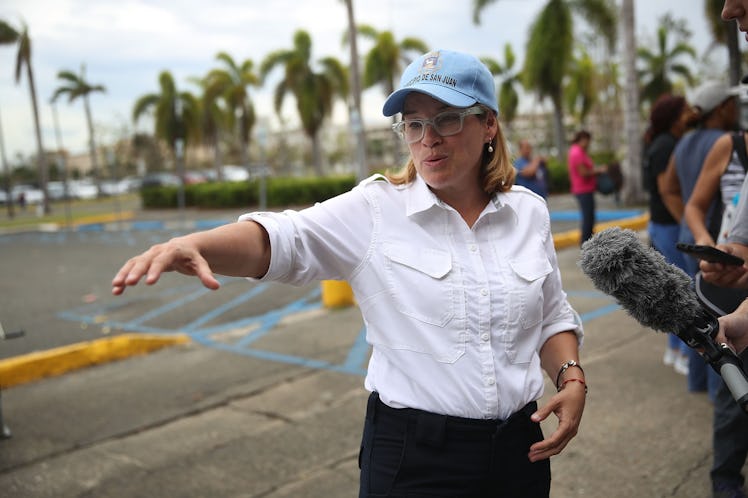
FEMA Says They've "Filtered Out" San Juan’s Mayor’s Desperate Pleas For Help
San Juan Mayor Carmen Yulín Cruz has again found herself at the center of controversy over the federal government's response to Hurricane Maria. On Oct. 8, the head of the Federal Emergency Management Agency (FEMA) Brock Long said that FEMA is ignoring San Juan's mayor on Twitter. “We filtered out the mayor a long time ago... We don't have time for the political noise," Long said in an interview on ABC News' This Week.
The FEMA administrator was responding to a series of early morning tweets where Cruz criticized the U.S. government's response to the crisis. Among the posts, the mayor said that FEMA did not respond to her requests for help after power collapsed at a San Juan hospital (FEMA did not immediately respond to a request for comment from Elite Daily).
"We're restringing a very fragile system every day. As we make progress, simple thunderstorms pass through, knock the progress out," Long added in his interview with ABC's Martha Raddatz.
Since Maria devastated the U.S. territory three weeks ago, Cruz has found herself front and center in the debate over the federal government's response to the crisis. In the days after the storm struck on Sept. 20, Cruz pleaded for help and said that the tardy response was "killing us with the inefficiency," to which President Donald Trump tweeted that she had "such poor leadership."
The barbs continued through Trump's visit to the island on Oct. 3 when, during a briefing with officials, the president joked that the island had "thrown our budget a little out of whack." After the visit, Cruz told CNN that she hoped Trump would stop "spouting out comments" that hurt Puerto Ricans. The day after, Cruz didn't back down. In an interview with Univision on Oct. 4, she wore a shirt with the word "NASTY" printed across the front.
Puerto Rico is still reeling from the impact of Maria.
The storm initially left most of the island without power and drinking water. According to the Puerto Rican government, just 11.7 percent of residents have electricity. According to figures from FEMA, over half of Puerto Rico Aqueduct and Sewer Authority customers have drinkable water, and three-quarters of grocery stores are open on the island.
Late last week, several media outlets noted that statistics about how the island was faring briefly disappeared from FEMA's website, including those that documented how all but a fraction of the island was without electricity.
In a guide outlining how to help the island, the Puerto Rican government requested supply donations, including first aid kits, water and mosquito repellent. Meanwhile, organizations are asking for cash, rather than supplies, so that they can help people more quickly.
And now, FEMA could soon be tasked with managing the response to as many as four storms, as Hurricane Nate makes its way towards the United States.
Currently, the agency is responding to the damage from Hurricanes Harvey and Irma in Texas, Florida and the Virgin Islands, in addition to Maria's effect on Puerto Rico. According to Long, the agency is "strained" when it comes to resources. He told ABC News,
Bottom line is ... that over nearly 85 percent of my entire agency is deployed right now. We're still working massive issues in [response to hurricanes] Harvey, Irma, as well as the issues in Puerto Rico and the Virgin Islands, and now this one.
In the wake of the storm, celebrities and newsmakers have pitched into the recovery efforts.
Bethenny Frankel, a cast member on the 'Real Housewives of New York,' has visited the island and reportedly chartered four planes filled with food and medical supplies. On Oct. 6, 'Hamilton' creator Lin-Manuel Miranda and other Latinx artists released a song called "Almost Like Praying" benefitting The Hispanic Federation, an organization that works to support Hispanic families and Latino institutions.
According to Vox, it could be six months before the island regains full electricity — and the amount of help the territory gets could make all the difference. The road to recovery is long, and it's just getting started.